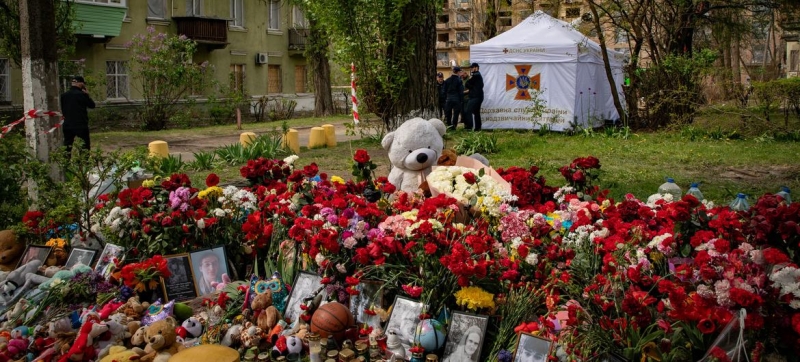
Memorial in memory of those killed in the attack in Kyiv, Ukraine. The UN General Assembly heard a new report from the Independent Commission on Ukraine International Law
In coordinated actions such as drone attacks, as well as deportations and forced population transfers, Russian authorities have forced Ukrainian civilians from their homes. This is stated in the new report of the Independent International Commission of Inquiry on Ukraine, which was presented to the UN General Assembly on Monday.
According to the report, short-range drone attacks carried out by the Russian military have spread over a wider area and beyond the area defined in the Commission’s May 2025 investigation. The territory that came under shelling stretches along a line more than 300 kilometers long on the right bank of the Dnieper in the Dnepropetrovsk, Kherson and Nikolaev regions. Documented cases of attacks, according to the Commission, indicate that units of the Russian armed forces deliberately launched attacks from the left bank of the Dnieper against civilians and civilian infrastructure, operating under centralized command and using similar tactics.
Regular attacks by Russian armed forces on front-line areas have led to the death and injury of civilians, large-scale destruction, and forced thousands of people to flee, Commission experts said. They concluded that these drone attacks constituted crimes against humanity in the form of murder and forced population displacement.
Coordinated Pattern of Attacks
The report says that for more than a year, the Russian military carried out drone strikes against a wide range of civilian targets. This, according to the authors, led to the injury and killing of civilians, significant destruction and the spread of fear among the population. The targets of the attacks, according to the investigation, were residential buildings, medical facilities and other civilian infrastructure, as a result of which the work of vital services was disrupted. The commission stated that ambulances and fire brigades had been shot at, despite their special protection guaranteed by international humanitarian law.
Residents of the affected areas described extremely difficult living conditions. One woman reported: “UAVs hit any car, attack any transport. Nobody comes here – not firefighters, not ambulances, no one at all.”
The Commission emphasizes that many attacks were carried out according to a coordinated pattern, namely with the participation of several drones or one drone dropping several munitions in succession. Often the first drone would punch a hole in the roof, and the second would drop explosives there. Such attacks often caused fires. Some drones used incendiary munitions. One of the witnesses said: “This is not just an explosion – the shell immediately flares up, like fireworks.”
The commission identified the specific perpetrators of the attacks, UAV units and associated military units, as well as commanders stationed on the left bank of the Dnieper. All of them, according to the report, belong to the Dnepr Group of Forces of the Russian Federation.
Forcible displacement
The document also noted that the Russian authorities carried out coordinated deportations and forcible transfers of the population from the areas of the Zaporozhye region under their control. Members of the Commission stated that such actions qualify as war crimes.
Thus, the report states that in 2024–2025, the Russian authorities deported Ukrainian civilians from the occupied areas of the Zaporozhye region to Georgia, referring to the legislation of the Russian Federation on the legal status of certain categories of foreign citizens. The deportation executors brought the victims to the Russian-Georgian border and forced them to cross it.
In 2022–2023, Russian authorities transferred civilians to Ukrainian government-controlled areas, accusing them of acting against the Russian Federation. The victims, according to the Commission, were taken to a checkpoint on the border of Russian-controlled territory. There they were forced to cross a dangerous operational zone of 10 to 15 km in length to reach a Ukrainian checkpoint.
Inhumane treatment
During deportations and forced transfers of victims, it is common they detained, confiscated their documents and personal belongings, and some of them were tortured. Such actions, which cause severe physical and mental suffering, constitute war crimes of inhumane treatment and violations of human rights, the members of the Commission emphasized. systematic and coordinated policies. Among the perpetrators are the Migration Directorate of the Ministry of Internal Affairs of the Russian Federation, employees of the Federal Security Service (FSB) and other authorities.
The commission also considered allegations by the Russian authorities about attacks by the Ukrainian armed forces using drones on civilian targets in Russian-occupied territories. However, the investigation could not be completed due to lack of access to the territory, risks to the safety of witnesses and lack of responses to official requests from the Commission sent to the Russian authorities.
